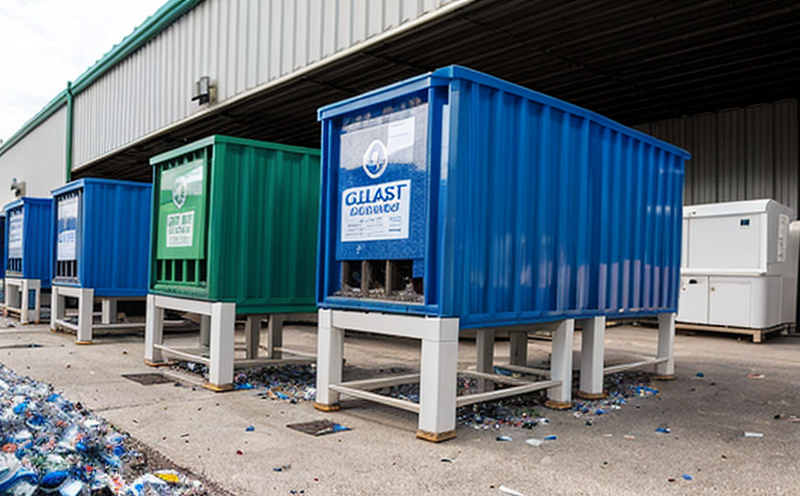EN 12882 Autoclave Resistance of Glass Waste
The European Standard EN 12882 specifies a method to determine the autoclave resistance of glass waste. This test is crucial for assessing the quality and suitability of waste glass for recycling processes, ensuring that it can withstand the high temperatures and pressures encountered in modern recycling facilities.
Autoclave resistance testing evaluates how well the waste glass retains its physical properties under extreme conditions simulating those found in industrial recycling plants. The standard applies to various types of waste glass including window glasses, bottles, jars, and other container glasses. It is particularly important for ensuring that recycled materials meet quality standards set by environmental regulations.
The test method involves placing the sample in an autoclave with a mixture of water and sodium hydroxide (NaOH), which simulates the leaching environment encountered during recycling processes. After exposure to these conditions, the test measures any weight loss or chemical changes that occur due to dissolution. A higher resistance indicates better suitability for further processing into new products without compromising on performance.
This testing procedure helps manufacturers and waste management companies make informed decisions about which glass materials are most suitable for recycling efforts. By identifying robust waste streams early in the process, they can optimize resource recovery rates while minimizing environmental impacts associated with landfills or incineration of non-recyclable waste.
For industries focused on sustainability goals, understanding the autoclave resistance properties allows them to develop more efficient and effective recycling programs. This knowledge also supports innovation in product design by informing material choices that enhance durability while maintaining aesthetic appeal.
The importance of this test cannot be overstated as it plays a vital role in promoting circular economy principles within the glass manufacturing sector. Through rigorous quality assurance measures like EN 12882, businesses contribute towards reducing waste generation and fostering sustainable development practices globally.
| Aspect | Description |
|---|---|
| Sample Preparation | The sample should be crushed into pieces no larger than 10 mm before being placed in the autoclave. Each piece must have a flat surface to ensure uniform contact with the leaching solution. |
| Leaching Solution Composition | A mixture of water and sodium hydroxide at a ratio of 1:0.5 (w/w) is used for this test. The temperature inside the autoclave is set to 120°C, maintained for 3 hours. |
- Ensures consistent quality across different batches of recycled glass.
- Promotes efficient use of raw materials by identifying suitable waste streams early in the process.
- Aids in compliance with international standards for sustainable resource management.
- Supports continuous improvement initiatives aimed at enhancing recycling technologies and practices globally.
Scope and Methodology
| Step | Description |
|---|---|
| Crushing | The sample should be reduced to particles no greater than 10 mm in size. This ensures even distribution within the autoclave and accurate measurement of weight loss. |
| Lay Flat | All pieces must have a flat surface to ensure optimal contact with the leaching solution during the test period. |
| Component | Description |
|---|---|
| Sodium Hydroxide (NaOH) | Used at a ratio of 1:0.5 (w/w) with water to simulate the leaching environment. |
| Temperature | The autoclave is held at 120°C for exactly three hours, allowing sufficient time for dissolution processes. |
Eurolab Advantages
At Eurolab, our commitment to excellence in waste management and recycling testing sets us apart as leaders in this field. With state-of-the-art facilities equipped with the latest analytical equipment, we provide precise and reliable results that meet or exceed international standards.
We offer a comprehensive range of services tailored specifically for glass and ceramic recycling industries. Our experienced team of experts ensures accurate sample preparation and interpretation of results using advanced techniques such as X-ray fluorescence (XRF) spectrometry and scanning electron microscopy (SEM).
Our approach not only guarantees compliance with EN 12882 but also provides valuable insights into potential improvements in recycling processes. By leveraging cutting-edge technology, we help clients optimize their operations for greater efficiency and cost-effectiveness.
In addition to testing services, Eurolab offers training programs designed to educate professionals on best practices related to waste management and recycling. These courses cover topics ranging from proper sampling techniques to interpreting complex data sets generated by modern analytical instruments.
With a strong focus on customer satisfaction, we strive to build long-term relationships based on trust and mutual respect. Our goal is to contribute positively to the global effort towards achieving cleaner environments through responsible waste management practices supported by robust scientific evidence provided via our testing services.
Environmental and Sustainability Contributions
- Reduces landfill usage by facilitating efficient recycling of glass waste into new products.
- Promotes the reuse of resources, thereby reducing raw material extraction demands on natural environments.
- Encourages innovation in product design that aligns with circular economy principles.
- Supports compliance with environmental regulations and promotes corporate social responsibility (CSR).
- The test helps identify waste streams that are most suitable for recycling, ensuring minimal contamination levels.
- By improving the quality of recycled materials, it enhances product performance while minimizing adverse effects on ecosystems.
- Aids in reducing greenhouse gas emissions associated with manufacturing new products from virgin raw materials.





